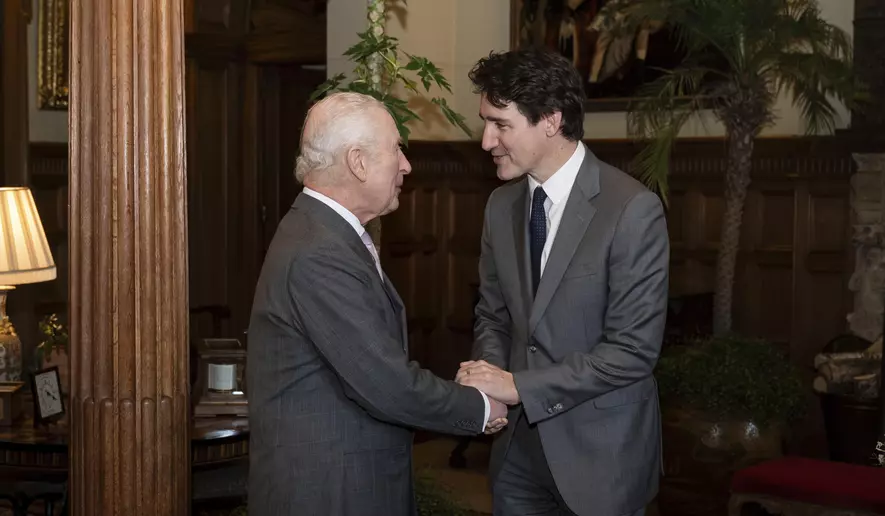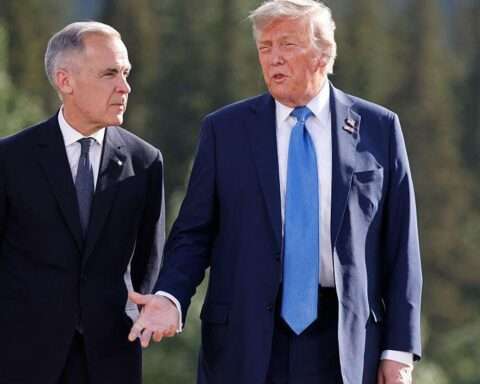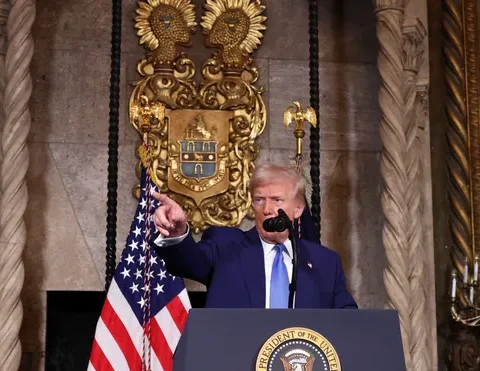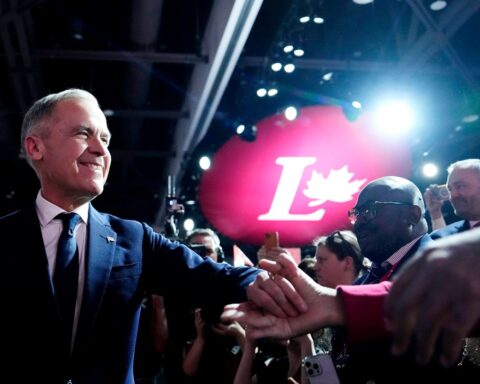March 3, 2025 – London, United Kingdom – As Canadian Prime Minister Justin Trudeau arrived in London on Monday, March 3, for an audience with King Charles III, the shadow of U.S. President Donald Trump’s provocative statements about Canada loomed large. The outgoing Canadian leader, set to resign later this month as his Liberal Party selects a new head, used the visit to underscore Canadian sovereignty amid escalating tensions with Washington. Trump’s recent remarks—ranging from suggesting Canada become the 51st U.S. state to accusing it of economic and security freeloadership—have ignited a diplomatic firestorm, dominating headlines and complicating Trudeau’s final days in office.
The BBC reported that Trudeau vowed to “stand up for Canadian sovereignty” during his meeting with the King, marking a symbolic appeal to Canada’s Commonwealth ties as a counterweight to U.S. pressure. Trump’s rhetoric, amplified in recent weeks, has included claims that Canada’s economy depends entirely on American subsidies and that its military is inadequate to protect itself. “Without this flow of capital, Canada ceases to exist as a viable country,” Trump posted on Truth Social on Sunday, a statement that has drawn sharp rebuke from Canadian officials and fueled a surge of national defiance.
Trump’s Escalating Rhetoric
Trump’s comments, chronicled across multiple outlets, have grown increasingly pointed since his re-election in November 2024. CNN detailed an earlier incident in December, when Trump, during a dinner at Mar-a-Lago, responded to Trudeau’s concerns about proposed 25% tariffs on Canadian goods by quipping that if the tariffs “killed” Canada’s economy, it could simply join the U.S. as the 51st state with Trudeau as its governor. The remark, initially framed as trolling, has since hardened into a recurring theme. In a February 10 Fox News interview before the Super Bowl, Trump doubled down, calling Canada’s integration “a great idea” for national security and economic gain, claiming it would eliminate the “artificially drawn line” of the border.
Fox News reported Trump’s latest salvo on Sunday, where he accused Canada of being “very abusive” to the U.S., citing trade imbalances and a lack of military spending. “They don’t take our cars, they don’t take our farm products, they take almost nothing,” Trump told reporters, defending his tariffs—set to take effect Tuesday on goods from Canada, Mexico, and China—as a necessary corrective. He also reiterated a false claim that the U.S. trade deficit with Canada exceeds $200 billion, a figure debunked by CNN, which cites the U.S. Bureau of Economic Analysis pegging the 2023 goods-and-services deficit at $40.6 billion.
NBC highlighted Trump’s broader narrative of Canadian dependency, quoting his February 22 assertion that Canada lacks “military protection” and needs U.S. safeguarding against global threats. “They don’t have a military, essentially,” Trump said, a claim refuted by experts like Stephen Saideman of Carleton University, who told CNN that Canada’s defense spending, while below NATO’s 2% GDP target, still ranks it among the alliance’s bigger absolute spenders due to its large economy.
Trudeau’s Response and the Royal Visit
Trudeau’s meeting with King Charles III, as covered by the BBC, was steeped in this context. The King, as Canada’s head of state within the Commonwealth, faced calls from figures like former Alberta Premier Jason Kenney to vocally back Canadian sovereignty—a delicate task given his constitutional role requires acting only on the prime minister’s advice. Trudeau, for his part, sought to project resilience, telling reporters, “Canada stands strong as a nation, and we will defend our interests and our values.” The visit, though ceremonial, served as a platform to rally domestic support amid Trump’s verbal onslaught.
Canadian media, including the Toronto Star, have dissected Trump’s claims with a mix of indignation and fact-checking. A February 15 analysis by the Star debunked his trade deficit exaggerations, noting that U.S. imports of Canadian crude oil—3.9 million barrels daily in 2023—benefit American refineries and keep gas prices low, undermining Trump’s portrayal of a one-sided relationship. The Welland Tribune echoed this, calling Trump’s rhetoric “a litany of comments, claims, and complaints” that distort reality as bilateral ties enter “one of its most unpredictable chapters.”
A Nation Stirs
Trump’s provocations have sparked a rare surge of Canadian patriotism, albeit in the country’s characteristically understated way. The Guardian reported on February 16 that his “diplomatic trolling” prompted disbelief and defiance, reviving debates about national identity. Posts on X captured this sentiment, with users mocking Trump’s annexation idea—one called it “a fever dream of a buffoon”—while others rallied behind hashtags like #CanadaIsNotForSale. Ontario Premier Doug Ford, a conservative often aligned with Trump’s ideology, told Fox News in January, “Property’s not for sale,” signaling a unified front against U.S. overreach.
Yet, the economic stakes are high. CNN’s December 18 analysis warned that Trump’s tariffs threaten a “profound recession” in Canada, exacerbating an already shaky political situation for Trudeau. The resignation of Finance Minister Chrystia Freeland in December, amid tensions over how to handle Trump, has left the Liberal government vulnerable as it trails the Conservatives by 20 points in polls ahead of a potential snap election. Trump’s tactics, including his Mar-a-Lago meeting with Trudeau, have shattered the cross-party unity Canada historically relied on in U.S. negotiations, with Ford’s threat to cut energy exports to the U.S. underscoring the rift.
International Ripples
The BBC noted that Trump’s statements resonate beyond North America, serving as a preview of his second-term strategy to bully allies into concessions. European leaders, gathered in London alongside Trudeau, expressed solidarity, with U.K. Prime Minister Keir Starmer announcing £1.6 billion in export finance for Ukraine—a signal of defiance against Trump’s isolationist leanings. France’s Emmanuel Macron, meanwhile, has pushed a truce proposal in Ukraine, though it’s met with skepticism in Canada, where memories of Russia’s 2019 ceasefire violations linger.
NBC’s coverage of Trump’s February phone call with Putin and subsequent Saudi talks with Russia—excluding Ukraine and Canada—underscored U.S. shifts that alarm Ottawa. Trudeau, speaking to CNN’s Christiane Amanpour in Munich last month, warned that American support “may no longer be guaranteed,” urging Europe to step up. Trump’s allies, like Vice President JD Vance, defend this pivot, arguing on X that diplomacy requires engaging adversaries, not coddling allies.
Critical Reflections
Trump’s fixation on Canada raises questions about intent and impact. Is it mere bluster, as suggested by some X posts, or a calculated push to renegotiate the USMCA trade pact in 2026? Fox News suggests the latter, with Trump eyeing “big concessions” from Canada and Mexico, nations he claims the U.S. “subsidizes.” Yet, his distortions—debunked by CNN and Canadian outlets—undermine his credibility. The U.S. benefits from Canadian oil and energy, a fact Trump omits when decrying trade deficits, revealing a selective narrative that prioritizes political wins over mutual gain.
For Canada, the response is a tightrope. Trudeau’s defiance, amplified by his royal audience, rallies national pride but risks economic retaliation—tariffs begin Tuesday, and Canadian media report plans for retaliatory levies on U.S. steel and orange juice. Critics, including some cited by CNN, argue Trudeau’s weakened position limits his leverage, a vulnerability Trump exploits. Conversely, Canadian resilience could harden Western resolve, exposing Trump’s approach as shortsighted if it alienates a key ally.
Looking Ahead
As of 9:51 PM +04 on March 3, 2025, Trudeau’s London visit concludes with no resolution in sight. Trump’s statements, provocative and persistent, have thrust Canada into an existential debate about its sovereignty and future. With tariffs looming and a leadership transition imminent, Canada faces a test of unity and grit. For now, Trudeau’s appeal to the King and the Commonwealth underscores a message to Trump: Canada may bend, but it will not break—not as a nation, and certainly not as the 51st state.






